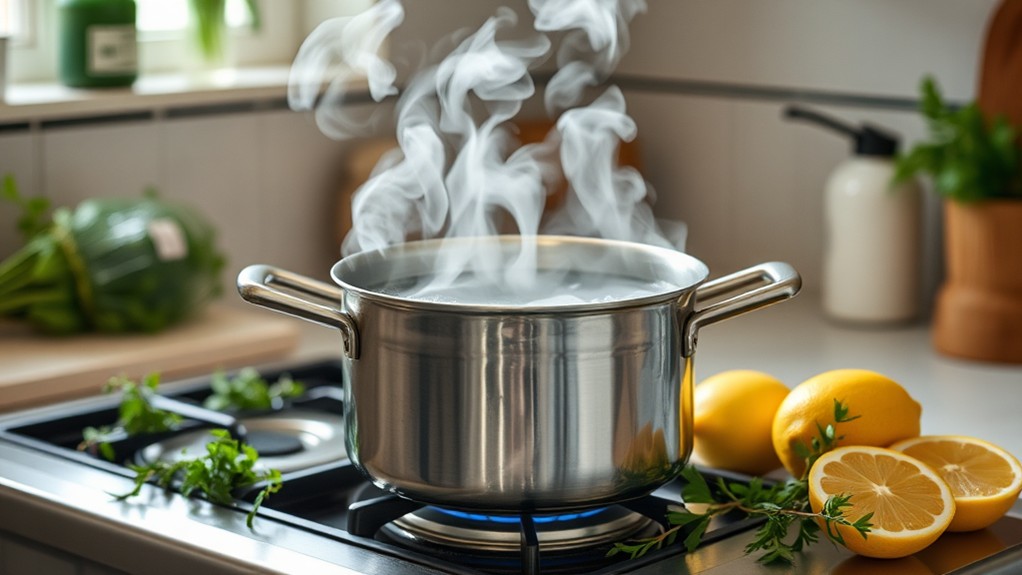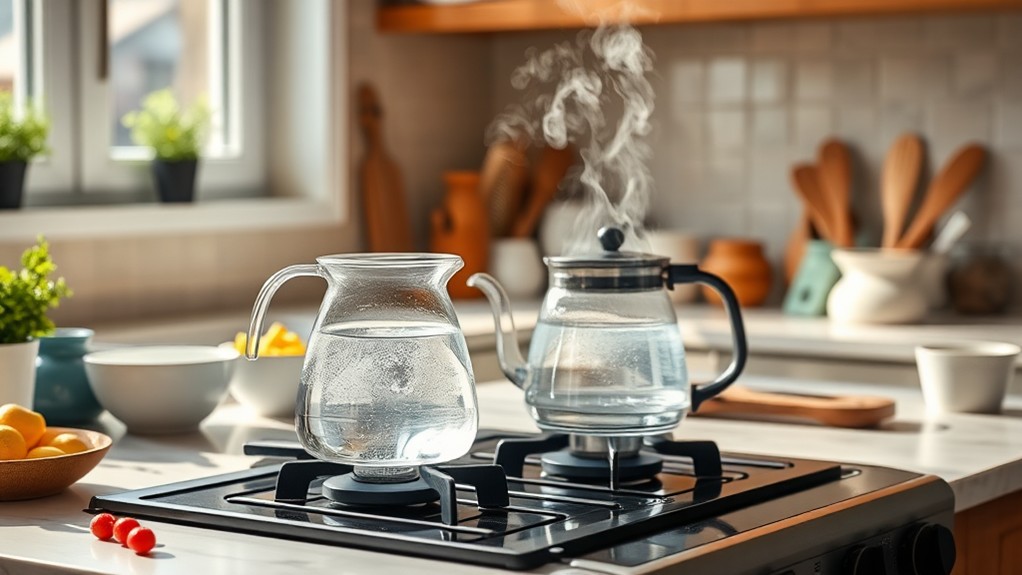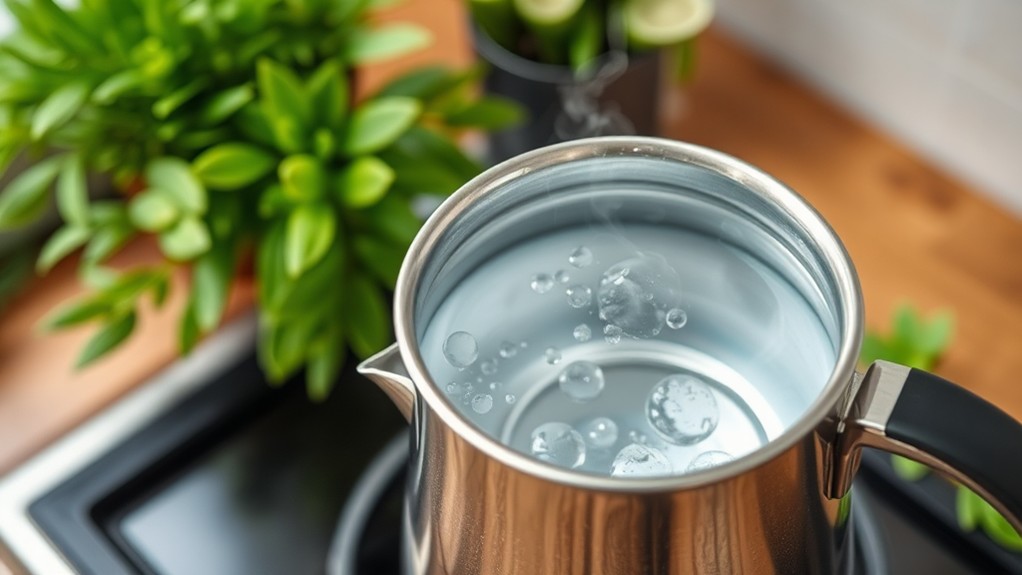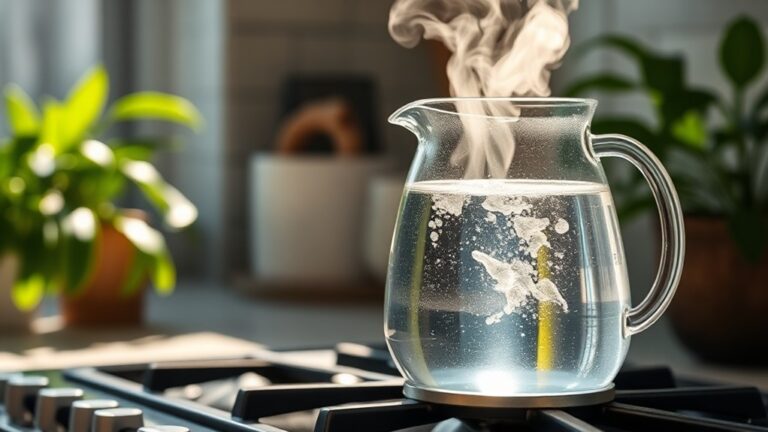Yes, it's safe to boil mineral water. Boiling effectively kills harmful pathogens like bacteria and viruses while keeping the essential minerals intact. I always recommend boiling for at least one minute, or three minutes if you're above 5,000 feet. Just keep in mind that boiling doesn't remove heavy metals or some contaminants, and it can alter the taste by flattening it. For the best results, using a covered pot helps retain minerals. Combining boiling with filtration can enhance your water quality further. If you're curious to discover more about safe practices, there are some interesting tips ahead.
Benefits of Boiling Mineral Water

When I think about the benefits of boiling mineral water, the first thing that comes to mind is safety. Boiling water is a simple yet effective way to make sure it's safe to drink. When you boil your water, it kills harmful pathogens like bacteria and viruses. This is essential, especially in emergencies or when water quality is uncertain.
While the boiling process doesn't remove minerals, it still disinfects the water. This means you get purified water that's safe and retains its essential mineral content.
Although boiled mineral water may taste a bit flat due to the loss of dissolved gases, it's still good for you. The minerals can help with hydration and overall health.
In a nutshell, boiling mineral water can greatly enhance its safety. This is important in keeping us healthy.
So, next time you're unsure about your water, consider boiling it. In many cases, boiled water is better than not having safe water at all.
Limitations of Boiling
Boiling mineral water has its limitations. While it effectively kills waterborne pathogens, it doesn't remove heavy metals like lead, arsenic, or uranium. These harmful substances can still remain in the water after boiling.
I've also learned that boiling can concentrate any existing contaminants that weren't reduced, which might increase their levels. This isn't an ideal situation.
Moreover, boiling mineral water doesn't eliminate disinfection byproducts or microplastics that might be present. If you're thinking boiling is a reliable method, you should reconsider. It's not a long-term solution for ensuring water safety, as it doesn't address all potential contaminants.
Additionally, the process of boiling alters the taste of the water. It reduces dissolved gases, leading to a flat flavor that many mightn't enjoy.
When I compare this to boiling tap water, it's clear that boiling alone isn't enough to keep our water safe.
Best Practices for Boiling

While boiling can kill harmful pathogens, it's important to follow best practices to assure you're getting the most out of your mineral water. To guarantee safe and tasty boiled water, keep these tips in mind:
| Best Practice | Explanation |
|---|---|
| Boil for the right time | Boil their water for one minute, or three minutes if you're above 5,000 feet. |
| Avoid excess boiling | Limit boiling time to preserve the flavor and beneficial minerals in bottled mineral water. |
| Use a covered pot | Covering the pot can help retain minerals and flavor while boiling. |
Before you boil, check the quality of your mineral water. Boiling doesn't remove chemicals or heavy metals, so it's wise to filter cloudy mineral water first. This step can enhance the disinfection process and provide you with clearer, safer water.
Comparing Boiling and Filtering
Choosing the right method to make mineral water safe can be confusing. There are two primary ways to treat water: boiling and filtering.
When I boil mineral water, it kills harmful waterborne pathogens. However, I've learned that it doesn't remove heavy metals or other chemicals that might be lurking in the water. This means I might still have contaminants, just like with tap water.
On the other hand, filtering mineral water can be more effective. Using advanced filtration processes, like reverse osmosis or UV disinfection, removes a broader range of contaminants, including those heavy metals.
Unlike boiling, which only disinfects, filtering improves overall water quality. It can even retain essential minerals that my body needs.
If there's a boil water advisory, I know boiling is good for eliminating pathogens quickly. But for better safety and taste, I prefer combining boiling with filtration.
This way, I make sure I'm not only killing any germs but also getting rid of other impurities. Finding that balance is key to enjoying safe, clean mineral water.
Understanding Water Quality

Understanding water quality is vital for anyone who cares about their health. When I think about the water I drink, I want to know what I'm consuming. Mineral water contains important minerals like calcium, magnesium, and potassium. These contribute to both its flavor and health benefits. However, the mineral content can vary widely between brands.
I've learned that boiling mineral water does kill harmful pathogens. But boiling doesn't remove harmful contaminants like heavy metals or chemicals. This means that while boiling can make water safer from germs, it won't enhance its mineral content or get rid of existing pollutants.
Another thing I find interesting is that boiling can lead to a flat taste due to the loss of dissolved gases. Regular testing of bottled mineral water is vital to guarantee it meets safety standards, but boiling isn't a dependable way to purify water from chemical pollutants.
For me, it's important to take into account the source and treatment of the mineral water I choose. It's not just about boiling; it's about understanding what I'm drinking and making sure it's safe and beneficial for my health.
Conclusion
To sum up, boiling mineral water can be safe, but it's important to know its limitations. While boiling can kill bacteria, it won't remove all minerals or impurities. I recommend using good practices like keeping your pot clean and not boiling it too long. If you're concerned about water quality, consider filtering instead. Ultimately, choosing the right method depends on your needs and what you want from your water. Stay safe and enjoy your hydration!

